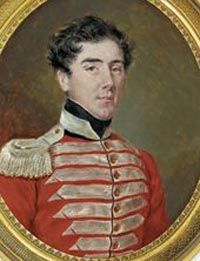Henry Dundas, 3rd Viscount Melville
Henry Dundas, 3rd Viscount Melville | |
|---|---|
 Henry Dundas, 3rd Viscount Melville | |
| Born | 25 February 1801 |
| Died | 1 February 1876 (aged 74) |
| Allegiance | |
| Service | |
| Rank | General |
| Commands | Commander-in-Chief, Scotland |
| Battles / wars | Canadian rebellion |
| Awards | Knight Grand Cross of the Order of the Bath |

General Henry Dundas, 3rd Viscount Melville GCB (25 February 1801 – 1 February 1876)[1] was a senior British Army officer and peer.
Military career
The eldest son of Robert Dundas, 2nd Viscount Melville, and his wife Anne, Dundas joined the Army as a lieutenant in the 3rd (or Scots) Guards in 1819.[2] He was promoted to captain of the 83rd Regiment in 1824, major in 1826 and lieutenant-colonel in 1829. In 1837 he was active in suppressing the Canadian rebellion, after which he was appointed colonel and aide-de-camp to Queen Victoria in 1841.[2]
He played a distinguished part in India as a brigadier-general in 1848–49, chosen to command the column sent from Bombay to co-operate with Lord Gough's army in the Second Anglo-Sikh War. He was second in command at the capture of Multan and then joined the main army with his force for the battle of Gujrat.[2]
He returned to England in 1850 and became 3rd Viscount Melville on his father's death in 1851. He became Commander-in-Chief, Scotland in 1854[3] remaining in that post until 1860, in which year he was made Governor of Edinburgh Castle.[2] He was raised to the rank of general in 1868.[2]
He died unmarried at Melville Castle, near Edinburgh in 1876. He is buried in the simple Dundas Vault in Old Lasswade Kirkyard, together with his ancestors and descendants.
His younger brother, Richard Saunders Dundas, was a prominent naval officer.
Parliament
He was a Member of Parliament (MP) for Rochester from 1826 to 1830,[4] and for Winchelsea from 1830 to 1831.[5]
Styles of address
- 1801-1811: Mr Henry Dundas
- 1811-1819: The Hon Henry Dundas
- 1819-1824: Lieutenant The Hon Henry Dundas
- 1824-1826: Captain The Hon Henry Dundas
- 1826: Captain The Hon Henry Dundas MP
- 1826-1829: Major The Hon Henry Dundas MP
- 1829-1831: Lieutenant-Colonel The Hon Henry Dundas MP
- 1831-1839: Lieutenant-Colonel The Hon Henry Dundas
- 1839-1841: Lieutenant-Colonel The Hon Henry Dundas CB
- 1841-1847: Colonel The Hon Henry Dundas CB
- 1847-1849: Brigadier-General The Hon Henry Dundas CB
- 1849-1851: Brigadier-General The Hon Sir Henry Dundas KCB
- 1851-1854: Brigadier-General The Rt Hon The Viscount Melville KCB
- 1854-1860: Major-General The Rt Hon The Viscount Melville KCB
- 1860-1865: Lieutenant-General The Rt Hon The Viscount Melville KCB
- 1865-1868: Lieutenant-General The Rt Hon The Viscount Melville GCB
- 1868-1876: General The Rt Hon The Viscount Melville GCB
References
- ^ Leigh Rayment's Peerage Pages – Peerages beginning with "M" (part 3)[self-published source] [better source needed]
- ^ a b c d e "Henry Dundas, 3rd Viscount Melville". Oxford Dictionary of National Biography. Retrieved 29 November 2014.
- ^ "The new army list and militia list January 1855". Retrieved 1 December 2014.
- ^ Leigh Rayment's Historical List of MPs – Constituencies beginning with "R" [dead link]
- ^ Leigh Rayment's Historical List of MPs – Constituencies beginning with "W" (part 4)
 This article incorporates text from a publication now in the public domain: "Dundas, Henry (1801-1876)". Dictionary of National Biography. London: Smith, Elder & Co. 1885–1900.
This article incorporates text from a publication now in the public domain: "Dundas, Henry (1801-1876)". Dictionary of National Biography. London: Smith, Elder & Co. 1885–1900.
External links
- Use dmy dates from April 2012
- Use dmy dates from October 2010
- 1801 births
- 1876 deaths
- British military personnel of the Second Anglo-Sikh War
- Viscounts in the Peerage of the United Kingdom
- British Army generals
- Upper Canada Rebellion people
- Dundas family
- King's Royal Rifle Corps officers
- Coldstream Guards officers
- 83rd (County of Dublin) Regiment of Foot officers
- Members of the Parliament of the United Kingdom for English constituencies
- Knights Grand Cross of the Order of the Bath
- UK MPs 1826–1830
- UK MPs 1830–1831
